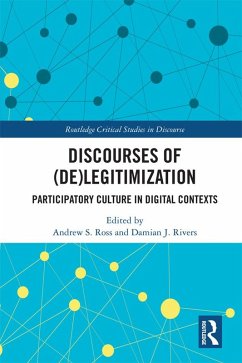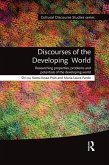Discourses of (De)Legitimization (eBook, PDF)
Participatory Culture in Digital Contexts
Redaktion: Ross, Andrew S.; Rivers, Damian J.
44,95 €
44,95 €
inkl. MwSt.
Sofort per Download lieferbar

22 °P sammeln
44,95 €
Als Download kaufen

44,95 €
inkl. MwSt.
Sofort per Download lieferbar

22 °P sammeln
Jetzt verschenken
Alle Infos zum eBook verschenken
44,95 €
inkl. MwSt.
Sofort per Download lieferbar
Alle Infos zum eBook verschenken

22 °P sammeln
Discourses of (De)Legitimization (eBook, PDF)
Participatory Culture in Digital Contexts
Redaktion: Ross, Andrew S.; Rivers, Damian J.
- Format: PDF
- Merkliste
- Auf die Merkliste
- Bewerten Bewerten
- Teilen
- Produkt teilen
- Produkterinnerung
- Produkterinnerung

Bitte loggen Sie sich zunächst in Ihr Kundenkonto ein oder registrieren Sie sich bei
bücher.de, um das eBook-Abo tolino select nutzen zu können.
Hier können Sie sich einloggen
Hier können Sie sich einloggen
Sie sind bereits eingeloggt. Klicken Sie auf 2. tolino select Abo, um fortzufahren.

Bitte loggen Sie sich zunächst in Ihr Kundenkonto ein oder registrieren Sie sich bei bücher.de, um das eBook-Abo tolino select nutzen zu können.
This volume provides a comprehensive analysis of the ways in which digital communication facilitate and inform discourses of legitimization and delegitimization in contemporary participatory cultures.
- Geräte: PC
- mit Kopierschutz
- eBook Hilfe
- Größe: 10.25MB
Andere Kunden interessierten sich auch für
![Discourses of Borders and the Nation in the USA (eBook, PDF) Discourses of Borders and the Nation in the USA (eBook, PDF)]() Massimiliano DemataDiscourses of Borders and the Nation in the USA (eBook, PDF)21,95 €
Massimiliano DemataDiscourses of Borders and the Nation in the USA (eBook, PDF)21,95 €![The Discourses of Capitalism (eBook, PDF) The Discourses of Capitalism (eBook, PDF)]() Christian W. ChunThe Discourses of Capitalism (eBook, PDF)43,95 €
Christian W. ChunThe Discourses of Capitalism (eBook, PDF)43,95 €![Discourses of Global Queer Mobility and the Mediatization of Equality (eBook, PDF) Discourses of Global Queer Mobility and the Mediatization of Equality (eBook, PDF)]() Joseph ComerDiscourses of Global Queer Mobility and the Mediatization of Equality (eBook, PDF)0,00 €
Joseph ComerDiscourses of Global Queer Mobility and the Mediatization of Equality (eBook, PDF)0,00 €![Discourses of Ideology and Identity (eBook, PDF) Discourses of Ideology and Identity (eBook, PDF)]() Chris FeathermanDiscourses of Ideology and Identity (eBook, PDF)33,95 €
Chris FeathermanDiscourses of Ideology and Identity (eBook, PDF)33,95 €![Discourses in Place (eBook, PDF) Discourses in Place (eBook, PDF)]() Ron ScollonDiscourses in Place (eBook, PDF)44,95 €
Ron ScollonDiscourses in Place (eBook, PDF)44,95 €![Discourses of the Developing World (eBook, PDF) Discourses of the Developing World (eBook, PDF)]() Shi-XuDiscourses of the Developing World (eBook, PDF)29,95 €
Shi-XuDiscourses of the Developing World (eBook, PDF)29,95 €![Discourses of the Arab Revolutions in Media and Politics (eBook, PDF) Discourses of the Arab Revolutions in Media and Politics (eBook, PDF)]() Stefanie UllmannDiscourses of the Arab Revolutions in Media and Politics (eBook, PDF)42,95 €
Stefanie UllmannDiscourses of the Arab Revolutions in Media and Politics (eBook, PDF)42,95 €-
-
-
This volume provides a comprehensive analysis of the ways in which digital communication facilitate and inform discourses of legitimization and delegitimization in contemporary participatory cultures.
Dieser Download kann aus rechtlichen Gründen nur mit Rechnungsadresse in A, B, BG, CY, CZ, D, DK, EW, E, FIN, F, GR, HR, H, IRL, I, LT, L, LR, M, NL, PL, P, R, S, SLO, SK ausgeliefert werden.
Produktdetails
- Produktdetails
- Verlag: Taylor & Francis eBooks
- Seitenzahl: 378
- Erscheinungstermin: 17. Oktober 2018
- Englisch
- ISBN-13: 9781351263870
- Artikelnr.: 56842547
- Verlag: Taylor & Francis eBooks
- Seitenzahl: 378
- Erscheinungstermin: 17. Oktober 2018
- Englisch
- ISBN-13: 9781351263870
- Artikelnr.: 56842547
- Herstellerkennzeichnung Die Herstellerinformationen sind derzeit nicht verfügbar.
Andrew S. Ross is a Lecturer in the School of Education and Social Work at the University of Sydney, Australia. His research interests are interdisciplinary and varied but include critical discourse studies, political communication, discourses of new media, and sociolinguistics. His work has been published such venues as Communication and Sport, The Language Learning Journal, Journal of Language, Identity and Education, and Discourse, Context and Media, and Australian Review of Applied Linguistics. He is the co-editor of the volume The Sociolinguistics of Hip-Hop as Critical Conscience: Dissatisfaction and Dissent (2017). See www.asross.com Damian J. Rivers is an Associate Professor [Communication] at Future University Hakodate, Japan. His research interests concern critical pedagogies, the discourse of social media and political communities of participation, and expressions of power within educational philosophy, policy and practice. He is co-author of Beyond Native-Speakerism: Current Explorations and Future Visions (2018, Routledge), editor of Resistance to the Known: Counter-Conduct in Language Education (2015) and co-editor of Isms in Language Education: Oppression, Intersectionality and Emancipation (2017), The Sociolinguistics of Hip-Hop as Critical Conscience: Dissatisfaction and Dissent (2017), Native-Speakerism in Japan: Intergroup Dynamics in Foreign Language Education (2013) and Social Identities and Multiple Selves in Foreign Language Education (2013). See www.hakodate7128.com.
Introduction: (De)Legitimization and Participation in the Digitized Public
Sphere
Andrew S. Ross and Damian J. Rivers
Part I: Participatory Language Use Online and Discursive Positioning
Chapter 1: (De)Legitimizing Language Uses in Language Ideological Debates
Online
Antonio Reyes
Chapter 2: Persuasion by Commonality: Legitimizing Actions through
Discourse on Common Sense in a Japanese Advice Forum
Giancarla Unser-Schutz
Chapter 3: A Name Rightly Given? The Use, Abuse, and Adoption of the Term
"Cybernat" During the Scottish Referendum Debate
Rowan R. Mackay
Chapter 4: Online Performances of Expertise by Sustainability
Practitioners: Tracing Communicative Episodes of Professional
(De)Legitimization
Rahul Mitra
Part II: Discursive (De)Legitimization through Social Media Participation
Chapter 5: 'Stop the Boats': Internet Memes as Case Study of Multimodal
Delegitimization of Australian Refugee Policy Rhetoric
Andrew S. Ross
Chapter 6: Understanding Participatory Culture through Hashtag Activism
after the Orlando Pulse Tragedy
Nicholas DeArmas, Jennifer Roth Miller, Wendy Givoglu, David Thomas Moran
and Stephanie Vie
Chapter 7: Digital Narratives of Struggle and Legitimacy in the Arab Spring
Aditi Bhatia
Chapter 8: Not the Desired Offspring: #FertilityDay, the Italian Ministry
of Health, and the Campaign that Wasn't
Tommaso Trillò
Chapter 9: Nike Y U No Do It Yourself: Decrowning Brands by Means of Memes
Vittorio Montieri
Part III: (De)Legitimization in Production, Participation and Performance
Chapter 10: Always On, But Never There: Political Parody, the
Carnivalesque, and the Rise of the 'Nectorate'
Annamaria Neag and Richard Berger
Chapter 11: Trolling as Creative Insurgency: The Carnivalesque
Delegitimization of Putin and His Supporters in Online Newspaper Commentary
Alla V. Tovares
Chapter 12: Political Cartoons as Creative Insurgency: Delegitimization in
the Culture of Convergence
Damian J. Rivers
Chapter 13: Participation That Makes a Difference and Differences in
Participation: Highrise - An Interactive Documentary Project for Change
Anna Wiehl
Chapter 14: Film Festival Participation and Identity Formation:
Non-Professional Creativity and the Pleasures of Mobile Filmmaking
Gavin Wilson
Part IV: (De)Legitimizing Participatory Discourses of Religion
Chapter 15: Modding as a Strategy to (De)Legitimize Representations of
Religion in the Civilization Game Franchise
Stefan Werning
Chapter 16: Identity, Social Media and Religion: (De)Legitimization of
Identity Construction through the Language of Religion
Soudeh Ghaffari
Sphere
Andrew S. Ross and Damian J. Rivers
Part I: Participatory Language Use Online and Discursive Positioning
Chapter 1: (De)Legitimizing Language Uses in Language Ideological Debates
Online
Antonio Reyes
Chapter 2: Persuasion by Commonality: Legitimizing Actions through
Discourse on Common Sense in a Japanese Advice Forum
Giancarla Unser-Schutz
Chapter 3: A Name Rightly Given? The Use, Abuse, and Adoption of the Term
"Cybernat" During the Scottish Referendum Debate
Rowan R. Mackay
Chapter 4: Online Performances of Expertise by Sustainability
Practitioners: Tracing Communicative Episodes of Professional
(De)Legitimization
Rahul Mitra
Part II: Discursive (De)Legitimization through Social Media Participation
Chapter 5: 'Stop the Boats': Internet Memes as Case Study of Multimodal
Delegitimization of Australian Refugee Policy Rhetoric
Andrew S. Ross
Chapter 6: Understanding Participatory Culture through Hashtag Activism
after the Orlando Pulse Tragedy
Nicholas DeArmas, Jennifer Roth Miller, Wendy Givoglu, David Thomas Moran
and Stephanie Vie
Chapter 7: Digital Narratives of Struggle and Legitimacy in the Arab Spring
Aditi Bhatia
Chapter 8: Not the Desired Offspring: #FertilityDay, the Italian Ministry
of Health, and the Campaign that Wasn't
Tommaso Trillò
Chapter 9: Nike Y U No Do It Yourself: Decrowning Brands by Means of Memes
Vittorio Montieri
Part III: (De)Legitimization in Production, Participation and Performance
Chapter 10: Always On, But Never There: Political Parody, the
Carnivalesque, and the Rise of the 'Nectorate'
Annamaria Neag and Richard Berger
Chapter 11: Trolling as Creative Insurgency: The Carnivalesque
Delegitimization of Putin and His Supporters in Online Newspaper Commentary
Alla V. Tovares
Chapter 12: Political Cartoons as Creative Insurgency: Delegitimization in
the Culture of Convergence
Damian J. Rivers
Chapter 13: Participation That Makes a Difference and Differences in
Participation: Highrise - An Interactive Documentary Project for Change
Anna Wiehl
Chapter 14: Film Festival Participation and Identity Formation:
Non-Professional Creativity and the Pleasures of Mobile Filmmaking
Gavin Wilson
Part IV: (De)Legitimizing Participatory Discourses of Religion
Chapter 15: Modding as a Strategy to (De)Legitimize Representations of
Religion in the Civilization Game Franchise
Stefan Werning
Chapter 16: Identity, Social Media and Religion: (De)Legitimization of
Identity Construction through the Language of Religion
Soudeh Ghaffari
Introduction: (De)Legitimization and Participation in the Digitized Public
Sphere
Andrew S. Ross and Damian J. Rivers
Part I: Participatory Language Use Online and Discursive Positioning
Chapter 1: (De)Legitimizing Language Uses in Language Ideological Debates
Online
Antonio Reyes
Chapter 2: Persuasion by Commonality: Legitimizing Actions through
Discourse on Common Sense in a Japanese Advice Forum
Giancarla Unser-Schutz
Chapter 3: A Name Rightly Given? The Use, Abuse, and Adoption of the Term
"Cybernat" During the Scottish Referendum Debate
Rowan R. Mackay
Chapter 4: Online Performances of Expertise by Sustainability
Practitioners: Tracing Communicative Episodes of Professional
(De)Legitimization
Rahul Mitra
Part II: Discursive (De)Legitimization through Social Media Participation
Chapter 5: 'Stop the Boats': Internet Memes as Case Study of Multimodal
Delegitimization of Australian Refugee Policy Rhetoric
Andrew S. Ross
Chapter 6: Understanding Participatory Culture through Hashtag Activism
after the Orlando Pulse Tragedy
Nicholas DeArmas, Jennifer Roth Miller, Wendy Givoglu, David Thomas Moran
and Stephanie Vie
Chapter 7: Digital Narratives of Struggle and Legitimacy in the Arab Spring
Aditi Bhatia
Chapter 8: Not the Desired Offspring: #FertilityDay, the Italian Ministry
of Health, and the Campaign that Wasn't
Tommaso Trillò
Chapter 9: Nike Y U No Do It Yourself: Decrowning Brands by Means of Memes
Vittorio Montieri
Part III: (De)Legitimization in Production, Participation and Performance
Chapter 10: Always On, But Never There: Political Parody, the
Carnivalesque, and the Rise of the 'Nectorate'
Annamaria Neag and Richard Berger
Chapter 11: Trolling as Creative Insurgency: The Carnivalesque
Delegitimization of Putin and His Supporters in Online Newspaper Commentary
Alla V. Tovares
Chapter 12: Political Cartoons as Creative Insurgency: Delegitimization in
the Culture of Convergence
Damian J. Rivers
Chapter 13: Participation That Makes a Difference and Differences in
Participation: Highrise - An Interactive Documentary Project for Change
Anna Wiehl
Chapter 14: Film Festival Participation and Identity Formation:
Non-Professional Creativity and the Pleasures of Mobile Filmmaking
Gavin Wilson
Part IV: (De)Legitimizing Participatory Discourses of Religion
Chapter 15: Modding as a Strategy to (De)Legitimize Representations of
Religion in the Civilization Game Franchise
Stefan Werning
Chapter 16: Identity, Social Media and Religion: (De)Legitimization of
Identity Construction through the Language of Religion
Soudeh Ghaffari
Sphere
Andrew S. Ross and Damian J. Rivers
Part I: Participatory Language Use Online and Discursive Positioning
Chapter 1: (De)Legitimizing Language Uses in Language Ideological Debates
Online
Antonio Reyes
Chapter 2: Persuasion by Commonality: Legitimizing Actions through
Discourse on Common Sense in a Japanese Advice Forum
Giancarla Unser-Schutz
Chapter 3: A Name Rightly Given? The Use, Abuse, and Adoption of the Term
"Cybernat" During the Scottish Referendum Debate
Rowan R. Mackay
Chapter 4: Online Performances of Expertise by Sustainability
Practitioners: Tracing Communicative Episodes of Professional
(De)Legitimization
Rahul Mitra
Part II: Discursive (De)Legitimization through Social Media Participation
Chapter 5: 'Stop the Boats': Internet Memes as Case Study of Multimodal
Delegitimization of Australian Refugee Policy Rhetoric
Andrew S. Ross
Chapter 6: Understanding Participatory Culture through Hashtag Activism
after the Orlando Pulse Tragedy
Nicholas DeArmas, Jennifer Roth Miller, Wendy Givoglu, David Thomas Moran
and Stephanie Vie
Chapter 7: Digital Narratives of Struggle and Legitimacy in the Arab Spring
Aditi Bhatia
Chapter 8: Not the Desired Offspring: #FertilityDay, the Italian Ministry
of Health, and the Campaign that Wasn't
Tommaso Trillò
Chapter 9: Nike Y U No Do It Yourself: Decrowning Brands by Means of Memes
Vittorio Montieri
Part III: (De)Legitimization in Production, Participation and Performance
Chapter 10: Always On, But Never There: Political Parody, the
Carnivalesque, and the Rise of the 'Nectorate'
Annamaria Neag and Richard Berger
Chapter 11: Trolling as Creative Insurgency: The Carnivalesque
Delegitimization of Putin and His Supporters in Online Newspaper Commentary
Alla V. Tovares
Chapter 12: Political Cartoons as Creative Insurgency: Delegitimization in
the Culture of Convergence
Damian J. Rivers
Chapter 13: Participation That Makes a Difference and Differences in
Participation: Highrise - An Interactive Documentary Project for Change
Anna Wiehl
Chapter 14: Film Festival Participation and Identity Formation:
Non-Professional Creativity and the Pleasures of Mobile Filmmaking
Gavin Wilson
Part IV: (De)Legitimizing Participatory Discourses of Religion
Chapter 15: Modding as a Strategy to (De)Legitimize Representations of
Religion in the Civilization Game Franchise
Stefan Werning
Chapter 16: Identity, Social Media and Religion: (De)Legitimization of
Identity Construction through the Language of Religion
Soudeh Ghaffari







